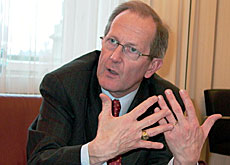Swiss feel safe within their borders

The Swiss continue to feel secure in their country and attach great importance to safety within the private sphere, says a nationwide study.
It also found that the policy of closer ties with the European Union appeared to be gaining ground with the public.
The report by the Federal Institute of Technology in Zurich (ETH), which was published on Friday, found that the feeling of security had increased slightly since last year.
In total, 87 per cent of respondents said they felt safe, a rise of two per cent on 2004.
The Security 2005 study found that for many, personal safety – relationships and proper health and social security cover – was more important than public safety.
Most relegated traffic safety, peace and quiet, order and the military to second place on their list of priorities.
Terrorism is seen as a threat by only 52 per cent of the population, compared with 67 per cent in 2003.
Confidence in institutions has also dropped, although it still remains above the average calculated since 1997. The police are the most well regarded, followed by the courts and then the government.
Two thirds of the population still considered the military to be necessary, while a lower share than in 2004 – but still more than half the population – regard defence spending to be too high.
EU ties
In terms of foreign policy, acceptance of the EU appears to have risen. In all, 57 per cent said they were in favour of closer ties with the EU, while only 40 per cent said they would like to join the organisation.
However, the percentage for joining is still behind previous values recorded between 1996-1999, which mostly showed a majority for the move.
“Swiss citizens vouch more frequently for Europe without, however, favouring an EU membership,” said the authors.
“Six out of ten believe that a further approach of Europe would contribute to national security. Just as many find that Switzerland should offer peacekeeping troops to the United Nations for international missions.”
However, support for neutrality remained unbroken, with 87 per cent firmly in favour.
swissinfo with agencies
The 2005 security study is the seventh report on the subject by the ETH.
1,200 people across all three language regions were surveyed between the dates of Janurary 17 and February 4 this year.
Two ETH institutions contributed to the study.
The Center for Security Studies was founded in 1986 and deals with national and international security issues.
The Military Academy is a training centre as well as an institute for military studies.
The annual security report is aimed at detecting trends in public opinion on security and military issues.

In compliance with the JTI standards
More: SWI swissinfo.ch certified by the Journalism Trust Initiative











You can find an overview of ongoing debates with our journalists here . Please join us!
If you want to start a conversation about a topic raised in this article or want to report factual errors, email us at english@swissinfo.ch.